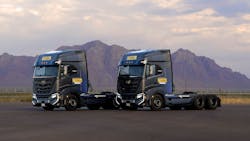J.B. Hunt expands fleet with 20 new Nikola FCEVs
J.B. Hunt Transport Services has announced the addition of 20 Nikola Tre fuel cell electric vehicles (FCEVs) to their fleet in order to expand sustainability solutions for customers with freight needs along the West Coast.
Several of the new FCEVs are anticipated to support J.B. Hunt Intermodal operations in California and will primarily be utilized for port and drayage transport. They are expected to help alleviate growing shipper concerns with recent requirements in the state aimed at reducing carbon emissions and adopting zero-emission vehicle technology, specifically rules from the California Air Resource Board (CARB) and the South Coast AQMD’s Warehouse Actions and Investments to Reduce Emissions (WAIRE) program.
Customers can eliminate WAIRE fees and reduce their carbon footprint by working with J.B. Hunt to schedule zero-emission vehicle pick-ups and deliveries.
“Our expertise, resources, and relationships uniquely position us to help our customers pursue and realize their sustainability goals,” said Greer Woodruff, executive vice president of safety, sustainability, and maintenance at J.B. Hunt. “Zero-emission vehicles such as these will help along the path to generate viable, sustainable options that help customers advance their efforts to reduce carbon emissions in their supply chain while also helping J.B. Hunt progress on its sustainability journey.”
The Nikola FCEVs will join over 200 alternative-powered equipment vehicles that J.B. Hunt currently operates on behalf of customers, which include battery-electric, hydrogen-electric, and renewable natural gas (RNG) powered vehicles. Fueling and infrastructure support will be provided by Nikola via its HYLA brand. J.B. Hunt purchased three Nikola FCEVs in 2023 that are currently supporting dedicated customer operations.
See also: Nikola's focus on hydrogen fuel cell EVs brings strong results and continued growth | Fleet Maintenance
Recently, J.B. Hunt kicked off a pilot program with Clean Energy featuring the new Cummins X15N engine, one of the latest developments in RNG-powered vehicles. J.B. Hunt also assisted customers Daimler Truck North America and Electrolux with adding alternative powered-vehicles to its operations.
J.B. Hunt aims to reduce carbon emission intensity 32% by 2034 from a baseline year of 2019, a goal highlighted in their focus areas of continuing to incorporate alternative-powered equipment into their fleet, expanding the use of biogenic fuels, and improving fuel economy, the company said. They surpassed the halfway mark for this goal last year.
